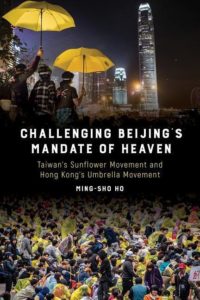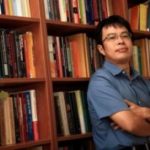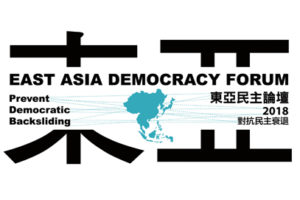 Taiwan’s 2014 Sunflower Movement unleashed a wave of youthful activism that has profoundly reshaped the island’s political landscape, showing how activists can effect change through elections, notes Ming-sho Ho, a professor of sociology at National Taiwan University. Taiwanese activists’ transition to party politics – a rare civil society shift from protest to power – has been possible partly because the Sunflower Movement was driven by citizens’ yearning for genuine democracy, not by disillusionment or alienation, he writes for Carnegie’s Civic Research Network.
Taiwan’s 2014 Sunflower Movement unleashed a wave of youthful activism that has profoundly reshaped the island’s political landscape, showing how activists can effect change through elections, notes Ming-sho Ho, a professor of sociology at National Taiwan University. Taiwanese activists’ transition to party politics – a rare civil society shift from protest to power – has been possible partly because the Sunflower Movement was driven by citizens’ yearning for genuine democracy, not by disillusionment or alienation, he writes for Carnegie’s Civic Research Network.
Although the initial 2014 protests were highly disruptive, the movement’s core demands for procedural justice, transparency, and political accountability in cross-strait negotiations were moderate, not radical, adds the author of the forthcoming book, Challenging Beijing’s Mandate of Heaven: Taiwan’s Sunflower Movement and Hong Kong’s Umbrella Movement (Temple University Press, 2019):
The protesters aimed to change the minds of those in power. When it turned out that obtaining electoral power was no more difficult than battling the police, why would any of them bother to break the law? Taiwan’s Sunflower protesters smoothly transformed into professional politicians because democracy has been popularly accepted as the only game in town.
 In 2014, the same year that the Sunflower Movement grabbed international attention as citizen protesters demanded the government withdraw its free-trade agreement with China, notes Ho (right), Hong Kong’s Umbrella Movement maintained 79 days of protests demanding genuine universal suffrage, Ho’s book observes:
In 2014, the same year that the Sunflower Movement grabbed international attention as citizen protesters demanded the government withdraw its free-trade agreement with China, notes Ho (right), Hong Kong’s Umbrella Movement maintained 79 days of protests demanding genuine universal suffrage, Ho’s book observes:
Both student-led movements featured large-scale and intense participation, with deep and far-reaching consequences. But how did two massive and disruptive protests take place in culturally conservative societies? And how did the two “occupy”-style protests against Chinese influences on local politics arrive at such strikingly divergent results?
![]() Just last week, international airlines stopped using its name; it lost hosting rights to a youth sports festival; and even a local children’s choir took a blow, prevented from singing at a United Nations building in Vienna, The New York Times reports:
Just last week, international airlines stopped using its name; it lost hosting rights to a youth sports festival; and even a local children’s choir took a blow, prevented from singing at a United Nations building in Vienna, The New York Times reports:
Amid those and other recent setbacks — blamed on pressure from China, which claims the self-governing island as its territory — has come a welcome bit of recognition. Taiwan has been chosen as the first Asian host for the Oslo Freedom Forum, an international human rights conference….Speakers at the Nov. 10 event in Taipei, Taiwan’s capital, are scheduled to include Mu Sochua, a Cambodian opposition politician living in exile, Yeonmi Park, a North Korean defector…Omar Sharif Jr., an Egyptian L.G.B.T. rights activist; Megha Rajagopalan, the China bureau chief for BuzzFeed News; and Russian democracy activist Vladimir Kara-Murza.
 “Taiwan is one of the most vibrant and successful democracies of the Third Wave of global democratization,” according to Stanford’s Larry Diamond, co-editor of Taiwan’s Democracy Challenged: The Chen Shui-bian Years, (with Yun-han Chu and Kharis Templeman) which details Taiwan’s democratic performance from 2000-2008.
“Taiwan is one of the most vibrant and successful democracies of the Third Wave of global democratization,” according to Stanford’s Larry Diamond, co-editor of Taiwan’s Democracy Challenged: The Chen Shui-bian Years, (with Yun-han Chu and Kharis Templeman) which details Taiwan’s democratic performance from 2000-2008.
Ketty Chen, vice president of the Taiwan Foundation for Democracy, which supported the Oslo forum with a grant, said Taiwan’s own path from dictatorship to democracy can serve as a reminder to Asian countries with authoritarian governments that things can improve, the Times adds.
“Even though global democracy has experienced a general trend of backsliding in the past few years, Taiwan’s democracy has persisted and continues to thrive,” Ms. Chen said. “Taiwan can continue to serve as inspiration to democrats in Asia, including those in China, even though its democratic future remains grim for now.”
 Taiwan’s experience as a robust democracy “helps counter the argument used by apologists for authoritarianism who point to the Arab Spring or to backsliding Asian countries like Thailand and the Philippines to claim that democracy brings chaos,” said National Endowment for Democracy President Carl Gershman. “Taiwan shows that democracy can bring economic progress and human fulfillment,” he told a recent TFD forum, highlighting the importance of Taiwan’s Democratic example in Asia and beyond. RTWT.
Taiwan’s experience as a robust democracy “helps counter the argument used by apologists for authoritarianism who point to the Arab Spring or to backsliding Asian countries like Thailand and the Philippines to claim that democracy brings chaos,” said National Endowment for Democracy President Carl Gershman. “Taiwan shows that democracy can bring economic progress and human fulfillment,” he told a recent TFD forum, highlighting the importance of Taiwan’s Democratic example in Asia and beyond. RTWT.







